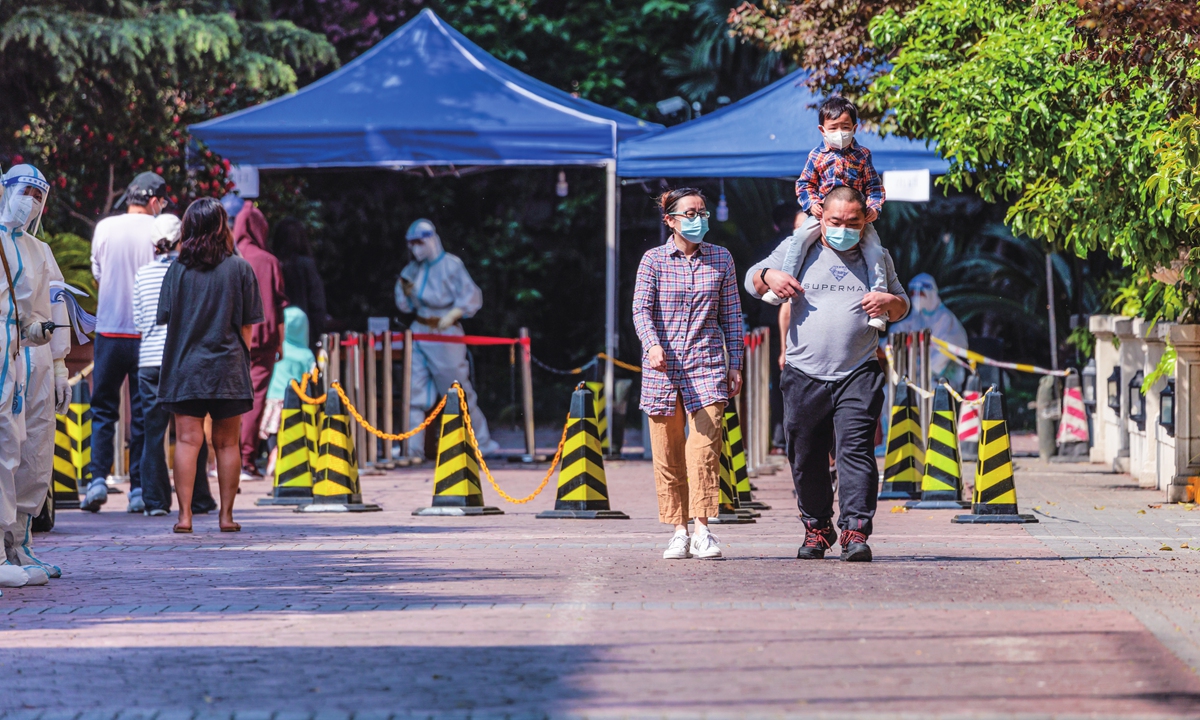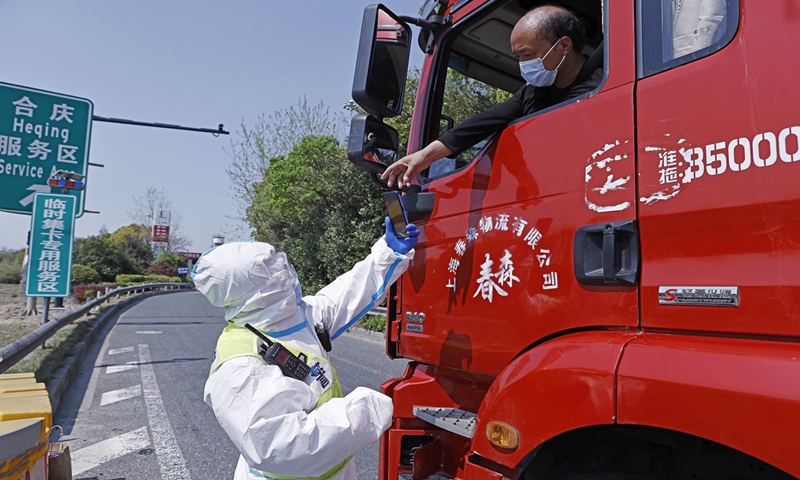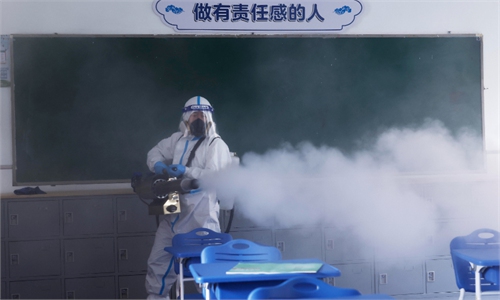Shanghai enters 'decisive battle' to stamp out infections within communities; doubles down control measures and testing

People line up for Covid-19 testing in a residential community in Shanghai, April 12, 2022. Photo: IC
Shanghai has entered a "decisive battle" to stamp out coronavirus infections within communities since Friday, as the local government announced measures to double down on quarantine measures in residential compounds and scale up nucleic acid tests. Epidemiologists believe those are necessary steps for the metropolis to clear up COVID-19 infections within communities as soon as early May.
Despite positive signs in Shanghai such as the downward trending of cases found outside the quarantined areas and more people being discharged from quarantine centers and hospitals, the numbers of deaths and people in severe conditions are rising. Experts said the treatment of severe cases will be the main priority for the next stage of the battle against COVID-19 in Shanghai. The city, engine of Chinas economic development, also ramped up business resumption amid strict epidemic control in order to assuage the stitches left by long-term stagnation.
Shanghai’s battle against COVID-19 has entered a key phase of stamping out viral infections within residential communities, the Shanghai authority told media on Friday in answering how long the citywide lockdown will last. Officials said the lockdown would be lifted in batches when virus transmissions outside quarantined areas are eliminated. A new round of testing has also been announced specifically categorized for different districts.
The Shanghai government held a meeting on Friday night in which it vowed to implement the central government’s guidance on Shanghai’s antivirus battle, and to eliminate viral infection within communities as soon as possible. It also promised to take a more forceful approach to implement a zero-COVID strategy across all aspects of the battle with the virus.
Wu Qianyu, an official from the Shanghai health authority, said at a Friday conference that the number of infections has dropped in six districts over the past few days.
The health authority also stressed the importance of sticking to the zero-COVID policy in Shanghai, and said the metropolis, an important port city in China, also faces the threat of imported infections. Officials also said there should be a swift response to staunch newly discovered infections, if they are found to have emerged.
Shanghai on Thursday night announced to step up COVID-19 testing and control in a new campaign from Friday involving "nine major" measures, some of which include more testing for all of its residents, restricting mobility to curb viral infections and rolling out epidemiological investigations.
Shanghai resident Li Cuihua, who lives in a residential community under sealed-off management, meaning she is not supposed and allowed to step out of her door, told the Global Times that her community issued a notice on Thursday night that the volunteers will come door to door to do nucleic tests for the residents in the upcoming five days.
Catherin You, a Shanghai resident, told the Global Times that Jingan district, where she lives and residents were previously allowed to walk outside the community, upgraded its restrictions on Thursday asking its residents not leave the compound and stay put at home, and only to go downstairs to get food and other life necessities.
Shanghai’s newest measures to expand testing and double down on quarantine measures are to serve the goal of staunching viral infections within communities in the city by early May, Chen Xi, an associated professor of public health at Yale University, told the Global Times on Friday.
He also pointed out the hidden danger is to avoid infections during mass testing.
Many Shanghai residents told the Global Times that their communities have asked them to maintain at least a distance of 2 meters when queuing up for tests.
Shanghai reported 15,698 new local asymptomatic coronavirus cases for Thursday, down from 15,861 one day earlier.The city also recorded 11 more COVID-19 patient deaths on Thursday, making the total number up to 36. All those deceased are elderly people, with average age around 80 years old, who were suffering from underlying conditions, and COVID wasn’t the direct cause of their deaths, Shanghai officials said.
Upcoming challenges
Epidemiologists pointed out that treatment of severe cases will be the major focus on Shanghai’s upcoming COVID-19 battle, as the city sees increasing numbers of severe cases and deaths in recent days.
Until Friday, Shanghai has reported 184 severe cases during the current wave of outbreak, among which 24 are in critical condition. Wu Qianyu said on Friday that Shanghai will form several medical teams and draw up high-quality medical resources to concentrate on treating those severe cases.
Chen said at current stage the focus for Shanghai should be on how to reduce deaths and severe cases. The curve of deaths and severe cases lags behind the infection curve as many cases in critical condition only emerged after being hospitalized for one to three weeks, said Chen, noting that as infections are believed to drop, the numbers of patients in critical conditions and deaths will scale up in the coming weeks.
This view was echoed by Zhuang Shilihe, a Guangzhou-based medical expert, who said that treatment of those patients wont be deterred only if the medical resources wont be further strained. Yet Zhuang pointed out that the number of patients discharged from quarantine centers and hospitals are reaching a balance with the number being admitted in. This is a positive sign, as it shows medical resources will be further relaxed.
Zhang Wenhong, head of the Shanghai panel overseeing the treatment of COVID-19, said during the ongoing Boao Forum for Asia annual conference on Thursday via video link that "there might be many indicators for us to decide whether we have gotten rid of the epidemic in the future, but the case fatality rates (CFR) of the vulnerable population, the elderly and those who have underlying conditions will always serve as a very important indicator."
Chen said another problem, as the quarantine is prolonged, is to guarantee smooth delivery of life necessities to the city’s residents.
Material supply has been a hot issue since Shanghai entered the latest lockdown, as many residents complained shortage of food and other materials, and some residents complained food delivered to them was to be expired, of inferior quality or produced by unqualified companies.
Shanghai authority vowed in the Friday interview published on the local governments WeChat account that the city has opened as many warehouses as the condition allows to increase supply, and guaranteed smooth supply of the goods. Officials also vowed to resort to quick and strict measures to crack down on those providing poor quality or forged commodities.
The Shanghai Commission for Discipline Inspection also intervened, vowing to investigate the matter. and the commission said it will hold accountable officials who neglected problems in food supply or took kickbacks from material supplies.
Ensuring the smooth delivery of quality materials is very important as problems in this section will waiver publics determination and cooperation with government, thus delay the governments goal of eliminating viral infections within communities, said Chen.

A policeman checks the nucleic acid test result of a truck driver at Heqing expressway service station in Shanghai, on April 11, 2022. Photo: VCG
Start the engine
Apart from doubling down the quarantine measures within communities, the city, dubbed the engine of Chinas economy, has ramped up business resumption amid epidemic control.
During the Friday conference, Shanghai’s deputy mayor Zhang Wei said that 70 percent of the 666 enterprises including SAIC Motor and Tesla, on the "whitelist" of key firms have resumed work and production in the past week, and their production capacity is also increasing.
Under Shanghai’s policy, the 666 enterprises have to satisfy certain requirements, including asking key staff to live within closed-loop management to avoid contacts with outsiders and reduce transmission risks. The companies are also required to set up quarantine sites just in case. Many companies will need to operate at reduced capacity because of the lack of facilities to accommodate all employees at the workplace.
The latest virus flare-up has hit Shanghai’s industrial operation hard, with the city's industrial output value above designated size growing by only 4.8 percent in the first quarter, Wu Jincheng, director of Shanghai Municipal Commission of Economy and Informatization, said on Friday, vowing to further expand production resumption in other industries so as to promote coordinated resumption of work and production across the industrial chain.
After a relatively long period of stagnation, the latest production resumption progress in key industries is a great start and has sent a very positive signal to the vast number of enterprises in Shanghai, as well as to the resumption of the supply chains, Zhong Zhechao, founder of One Shipping, an international logistics service consulting company, told the Global Times on Friday.
Yet the 666 key enterprises list only accounts for a small portion of Shanghai’s businesses, and further resumption still faces challenges including epidemic prevention and port congestion, Zhong said.
Shanghai is an important international port and the central hub of domestic and international industrial and supply chains, Zhang Wei said.
Since the outbreak of the latest flare-up, the efficiency of customs clearance and transportation of goods has been reduced, and logistics congestions have emerged in some places. In order to ease the congestions, the city has been promoting container transportation shift from "land to water" carriages and open "green channels" through railway to ensure the transport of key anti-epidemic materials and daily necessities, Zhang said.

